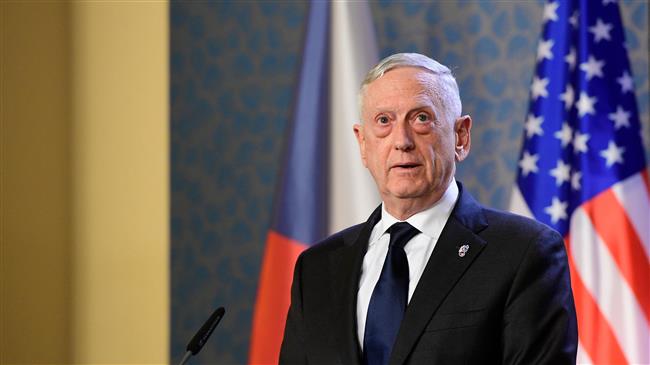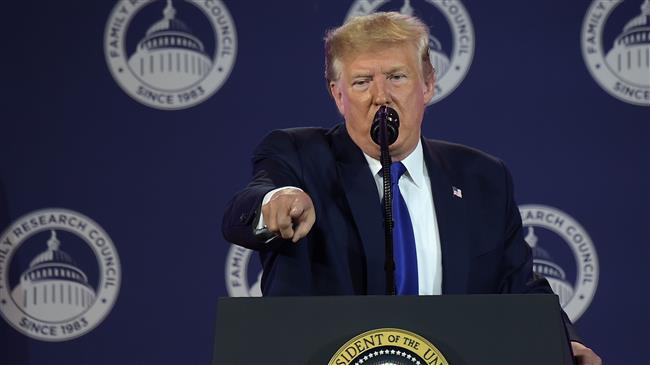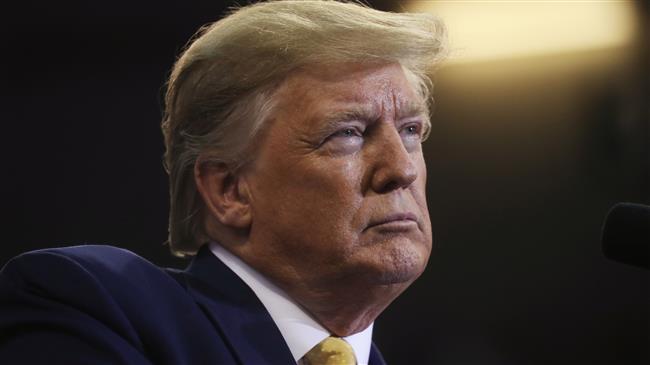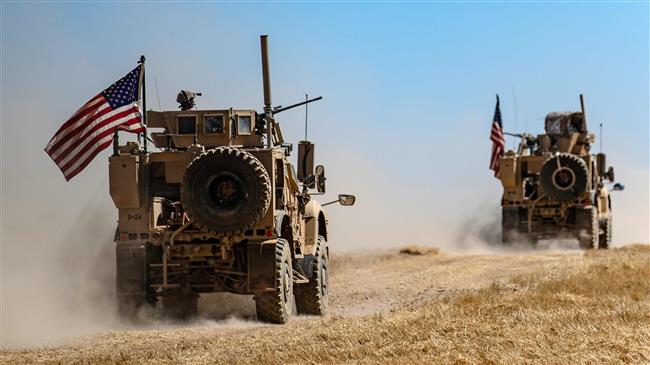US withdrawal creates turmoil in Middle East: Scholar
There are forces within both major US political parties that find President Donald Trump’s actions detrimental to American interests in the Middle East as they think the US troop withdrawal from Syria has created turmoil in the region, says Dennis Etler, an American political analyst who has a decades-long interest in international affairs.
In an interview with Press TV on Sunday, Etler, a former professor of Anthropology at Cabrillo College in Aptos, California, said, “The Trump administration’s spin machine has gone full tilt in trying to justify its withdrawal from the Syrian border region with Turkey."
"Trump’s precipitous action, after holding a phone conversation with Turkish President Erdogan, gives the appearance of a green light for Turkey's subsequent invasion of the border region in order to oust Kurdish fighters. The Kurds have been staunch allies of the US in the fight against Daesh terrorism and they see Trump’s reversal as a stab in the back and abject betrayal by a former ally," he said.
Former US Defense Secretary James Mattis said on Sunday that Daesh "will resurge" in Syria, following Trump's withdrawal of troops from the region.
"I think Secretary of State Pompeo, the intelligence services, the foreign countries that are working with us have it about right that ISIS (Daesh) is not defeated. We have got to keep the pressure on ISIS so they don't recover," Mattis said in an interview on NBC News.
Mattis' warning comes after Trump defended his decision to pull American forces out of northern Syria in the face of mounting criticism.
‘US imperialism always plays both sides against the middle’
“The situation highlights the conundrum of US foreign policy in the Middle East. US imperialism always tries to play both sides against the middle in order to seek maximum advantage for itself while keeping other players off-balance. Trump and his advisers, however, have this time found themselves trapped in a corner with no apparent exit,” he added.
“Trump says he is withdrawing forces from Syria to keep his campaign pledge of bringing US troops home and ending the string of endless wars that resulted from the so-called ‘war on terrorism,’ which in reality has been a war of terrorism against the world’s people in the service of US global hegemony,” he noted.
“Trump claims that he was victorious in the war against Daesh (aka IS, ISIS) and that it’s time to end the US presence in Syria. But, it was not the US that defeated Daesh, it was the combined efforts of the Syrian Arab Army, Russian air support and the aid of fraternal allies such as Iran and Hezbollah that defeated them. The Kurds, fighting for their own autonomy in conjunction with US logistical support also played a role in Daesh’s defeat, but it is incorrect to see it as their victory and their victory alone,” he said.
“As in Vietnam and elsewhere the US employs local militias to do their dirty work and then when they are no longer needed, either turns its back on them or actively works against them if they no longer serve the interests of their American sponsors. This is the case in Syria. This scenario is not unique to Trump, but US domestic considerations also come into play and the drive to unseat Trump has made the Syrian pullback a hot political issue,” the analyst said.
“There are forces within both major US political parties that find Trump’s actions detrimental to US interests in the Middle East. Democrats have wanted to broker some sort of negotiated deal with Iran and other forces in the region to leverage their own influence, while Republican hawks have lobbied for an increased US military presence and economic sanctions against Iran to force its retreat from activities supporting the legitimate governments of Syria and Yemen which have been under attack by a US-backed Israeli/Saudi Arabian coalition. Hence both sides of the political spectrum have denounced Trump's withdrawal from Syria as against US national interests. Both Democrats and Republicans support the Kurds as a third force that contributes to the destabilization of the region and the long-term US goal of balkanizing the region so as to make it easier to control,” he noted.
‘Trump throws a monkey wrench into a US calculus’
“Trump’s actions have thrown a monkey wrench into this calculus. But, then, what are the motives behind this sudden shift in US policy? The backlash resulting from the withdrawal has forced the US to say it will impose severe economic sanctions on Turkey if their attacks on the Kurds escalate. Turkey has given no indication that they are about to limit their offensive against them,” he noted.
“The Turkish attack may also lead to a resurgence of Daesh in some fashion. Turkey hopes to defeat the Kurds and then perhaps turn its guns against Assad. Do the hawks in the Trump administration see Turkey as a more reliable ally than the Kurds in its attempt to isolate Iran and restart the war that it lost in Syria? It’s difficult to say, as Trump and his handlers themselves don’t seem to have a grasp of what they are doing,” the commentator said.
“The US is now flailing about, trying to come up with some sort of coherent policy in the Middle East, but all they seem capable of doing is digging a deeper hole from which they cannot escape,” he observed.
Later on in his online remarks to Press TV while explaining how US troop withdrawal from Syria has created turmoil in the Middle East, Professor Etler said, “It's complicated. Previous US policy was to use Kurds as US surrogates. The Kurds in seeking autonomy from Turkey, Syria, Iraq and Iran are a wild card the US can use to advance its own interests. The withdrawal of US protection for the Kurds allows Turkey to reassert its influence in the region. Trump may want to use Turkey to challenge Iranian influence, but the dynamics of the region are very convoluted with Russia trying to woo both Turkey and Iran and supporting Syrian President Assad. There are many cross-currents and contradictions, hence turmoil.”
'Capitulation': Israeli officials and media concede Gaza defeat as truce unfolds
'Gaza has won': Social media users react to ceasefire with mix of relief, joy
Iran seeks South Korea’s assistance for AI, fiber-optic projects
VIDEO | Iran's 'Eqtedar' (Power) maneuver
Israel hits HTS military target in Syria for 1st time since fall of Assad
VIDEO | Press TV's news headlines
Israel has slaughtered 13,000 students in Gaza, West Bank
VIDEO | More Zionist than Zionists: Biden’s legacy to be defined by Gaza genocide















 This makes it easy to access the Press TV website
This makes it easy to access the Press TV website